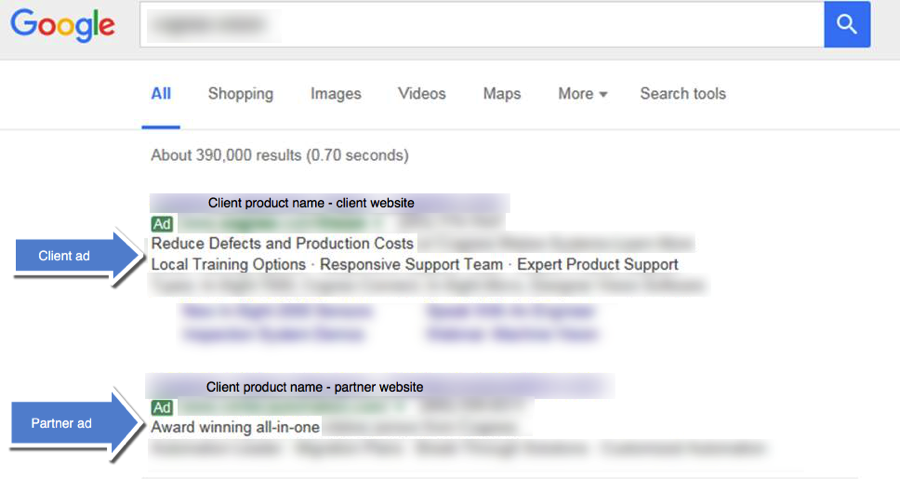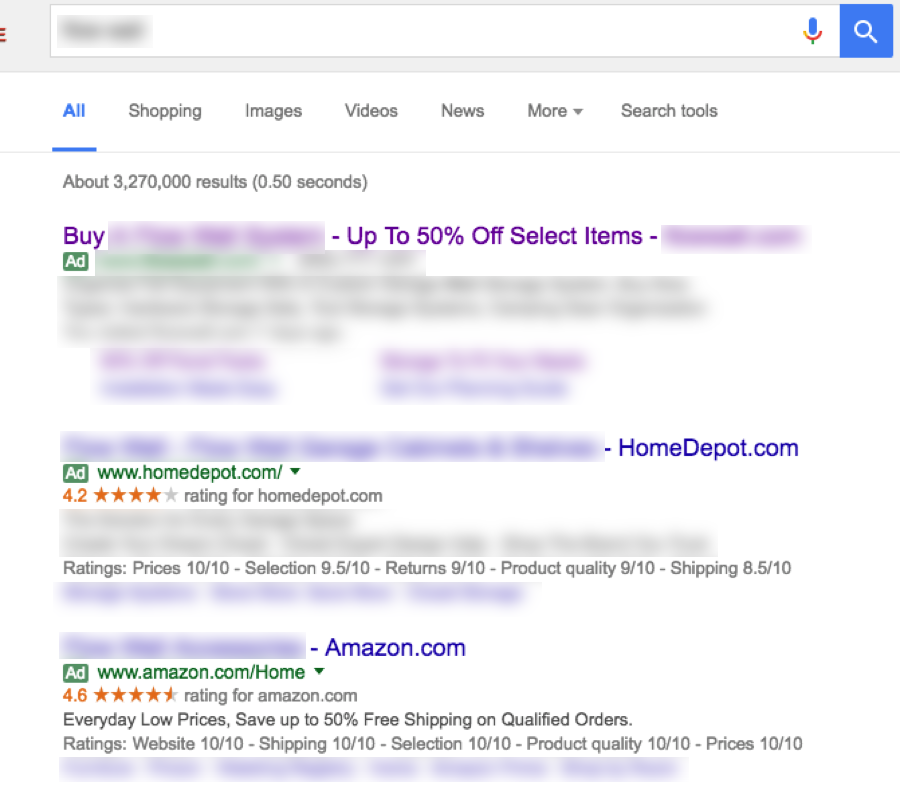Recently, a client called us and pointed out, with some dismay, that a partner was using the client’s branded product name in its PPC advertising.
Understandably, our client wanted to know—is the partner allowed to do that?
And the answer (as it often is in PPC) is this: it depends.

Brand Names as Keywords
One point is abundantly clear. Google won’t restrict PPC advertisers from using brand names (i.e. trademarks) as keywords. Even if your marketing team complains to Google, Google won’t investigate the issue.
So, your partners and competitors (and your marketing team!) are free and clear to use brand names as keywords.
But things get more nuanced when it comes to ad text.
Brand Names in Ad Text
Let’s start by examining the case our client brought to us.
A search on our client’s branded product name yielded the following result:

The first ad is our client’s ad.
The second ad is the partner’s ad. As you can see, it also includes our client’s branded product name but links to the partner’s website.
So what (if anything) can our client do about it?
Use of Brand Names by Authorized Resellers
The first thing to clarify is whether the advertiser is an authorized reseller.
Now you might think a company would automatically know who is and is not an authorized reseller. But often, it’s not so straightforward. Relationships with authorized resellers can be vast and complex.
So we advised our client to do some digging to confirm whether one of their departments had okayed the use of its brand name by that reseller.
If it turns out that the ad is run by an authorized reseller (where our client has granted permission for use by submitting the necessary form to Google) we would recommend that our client continue to keep an eye on the ad. The client should make sure the ad is consistent with the client’s branding and that the reseller complies with their agreement.
Unfortunately, we’ve seen situations where authorized resellers, partners and/or affiliates operate outside of agreed-upon terms. And things can get ugly, fast.
Another reason to keep an eye on these ads is to monitor whether resellers are offering promotions that beat our client’s promotions.
For example, we have clients who sell their own products on their website, but also sell them indirectly through resellers like Amazon and Home Depot.
Here’s an example of how those ads sometimes display when we search for the branded product name:

The top ad is our client’s ad.
And in this case, it looks like our client is offering the best deal (50 percent off selected items)—beating Amazon and Home Depot.
But sometimes, resellers offer discounts that are deeper than what our clients are offering, which poaches potential sales from these clients’ sites. And when clients make a better margin on products sold through their own sites than through resellers, that’s not a good thing.
Use of Trademarks by Non-Authorized Resellers
But what if our client hasn’t authorized the reseller to use the company’s brand name?
Then it’s time to take a closer look at Google’s policies.
Google specifically states that resellers are in compliance with its policies if (to paraphrase):
- The ad’s landing page is primarily dedicated to selling goods/services corresponding to the trademark (or components, replacement parts, etc. that correspond with the trademark).
- The goods/services are the primary focus on the ad’s landing page. The page must provide a way to purchase the goods/services or display commercial information about them.
Informational sites are in compliance if:
- The primary purpose of the ad’s landing page is to provide informative details about goods or services corresponding to the trademark.
In other words, it’s okay for advertisers to use your trademark if they’re genuinely selling your products through the site or providing information about them. What they can’t do is use your brand name as a bait-and-switch to promote other brands or products.
In addition, Google has several other restrictions with the general purpose of discouraging tricks that manipulate the system. You can find the complete policy in this AdWords help file.
How to File a Complaint
If we determine that the offending ad contravenes Google’s policies, then we need to make a formal complaint, using Google’s trademark complaint form.
Once received, Google will investigate the complaint and may restrict the use of our client’s trademark in ad text.
For example, we had a client who’s competitors were running PPC ads with a headline along the lines of, “We can do better than [client brand].” We felt this was contrary to Google policies (as the primary purpose of the landing pages was to sell the competitor’s brand, not the client’s brand), and we submitted a complaint to Google. Google investigated and ultimately restricted this use of the client’s brand name.
As you can see, you do have some recourse when it comes to unauthorized resellers or competitors leveraging your brand name. But before going to the effort of filing a complaint, do a bit of digging and analysis first—to make sure you’re not misreading the situation.






